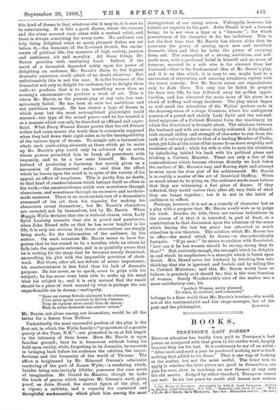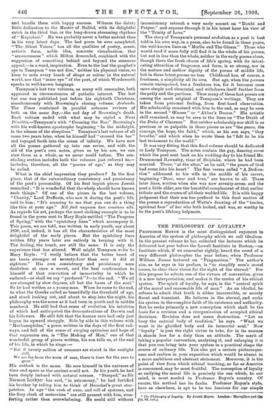BOOKS.
TENNYSON'S LAST POEMS.* ENOUGH attention has hardly been paid to Tennyson's last poems as compared with that given to his earlier work, largely because they are his last. It is customary to say of an artist : "After such-and-such a year he produced nothing new in kind, nothing that added to his fame." That is one way of looking at the matter, but not the most useful. The truer test to apply is whether the later pieces are good in themselves, are joys for ever, show in touching on new themes at any rate the old merits. Judged by either standard, Tennyson conies out well. In his last years he could still invent new metres • The Works of Tennyson. Annotated by Alfred, Lord Tennyson. Edited. by Hallam, Lord Tennyson. Vol. VII., " Demeter, and other Poems.- With a Port:': it of Emily, Lady Tennyson. Lot, don : Macmillan and Co. [4a. net.]
and handle them with happy success. Witness the dainty little dedication to the Master of Balliol, with its delightful catch in the third line, or the long-drawn streaming rhythms of " Kapiolani." He was probably never a better metrist than in his very latest days. The last poem he ever completed, "The Silent Voices," has all the qualities of poetry, music, artistic form, noble idea, concrete visualisation,. that " sensuousness " which Milton demanded, combined with the suggestion of something behind and beyond the sensuous appeal.—in a word, inspiration. Even to the last the prophet's eye in Tennyson " was not dim," neither his physical vision, so keen to note every touch of shape or colour in the natural world. nor that "inner eye" of the poet, of which Wordsworth speaks in well-known language.
Tennyson's last two volumes, as many will remember, both appeared in circumstances of pathetic interest. The last but one was published just before his eightieth Christmas, simultaneously with Browning's closing volume, Asolando. The Times contained in parallel columns reviews of both on the same day,—the sad day of Browning's death. Each volume ended -with what may be styled a Nunc Dimittis,—Tennyson's with " Crossing the Bar," Browning's with his well-known apostrophe beginning "In the midnight, in the silence of the sleeptime." Tennyson's last volume of all came two years later, when he himself had "crossed the bar" and voyaged forth into the ocean of infinity. We have now all the poems gathered up into one series, and with the aid of the poet's own notes, given us by his son, we can view them as a whole, as we never could before. The con- cluding section includes both the volumes just referred to,— includes, therefore, all the "poems of age," as they may be called.
What is the chief impression they produce P In the first place, that of the extraordinary consistency and persistency of the poet's personality. Of his first boyish pieces Jowett remarked : "It is wonderful that the whelp should have known such things." Of one of the pieces in the last volume, "Charity," Lord Dufferin, who saw it during the poet's life, said to him: "It's amazing to me that you can do a thing like this at your age." Nil fuit unquam tans constans sibi. As regards his art, perhaps the most striking example is to be found in the poem sent to Mary Boyle entitled " The Progress of Spring," with the "epistolary lines" which accompany it. This poem, we are told, was written in early youth, say about 1830, and, indeed, it has all the characteristics of the most delightful of the early pieces. But the epistolary lines written fifty years later are entirely in keeping with it. The feeling, the touch, are still the same. It is only the experience that has altered. Well might Tennyson write to Mary Boyle : " I verily believe that the better heart of me beats stronger at seventy-four than ever it did at eighteen." His own consistency and persistency were doubtless at once a secret, and the best confirmation to himself of that conviction of immortality in which he endured—or shall we say " perdured " ?—to the end. " We all are changed by slow degrees, all but the bases of the soul." So he bad written as a young man. When be came to the end, to what the Greeks called so beautifully the threshold of age, and stood looking out, and about to step into the night, his philosophy was the same as it had been in youth and in middle manhood. He still had that sense of evolution his intuition of which had anticipated the demonstrations of Darwin and his followers. He still felt that the human race bad only just begun its upward struggle. Side by side in this volume with " Mechanophilus," a poem written in the days of the first rail- ways, and full of the sense of surging optimism and hope of that expansive ,era, is " The Making of Man," one of that wonderful group of pieces written, his son tells us, at the end of his life, in which he sings "But if twenty million of summers are stored in the sunlight still, • We are far from the noon of man, there is time for the race to grow."
His outlook is the -same. He sees himself in the universe of time and space as the ancient could not. In his youth le had been deeply imbued with natural science. "Steeped," as Sir Norman Lockyer has said, "in astronomy," he had fortified his brother by telling him to think of Herschel's great star- patches. In age " the rush of suns, and roll of systems, and the fiery clash of meteorites " are still present with him, com- forting rather than overwhelming. He could still without
inconsistency retouch a very early sonnet on "Doubt and Prayer," and express through it in his latest hour his view of the "Trinity of Love."
The story of Tennyson's personal evolution as a poet is beat told in his own way, in a poem, also to be found in these pages, the well-known lines on " Merlin and The Gleam." Those who would read it more fully will find it in the whole of his poems, but not in less than the whole, neither in the early poems alone, though there the fresh charm of life's spring, with its intoxi- cating attraction of fragrance and form, is so strong, nor in the mature and mellow dignity of the poems of middle life, but in these latest poems no less. Childhood has, of course, a freshness, a simplicity all its own. But age, when the powers remain unimpaired, has a freshness too, for it becomes once more simple and elemental, and withdraws itself further from the petty and the partisan. Thus many of these last poems are among the most original of Tennyson's writings. They are taken from personal feeling, from first-hand observation. His scholarship remained with him to the end, as may be seen in the second " CEnone " or "Akbar's Dream." His artistic skill remained, as may be seen in the lines on "The Death of the Duke of Clarence." But neither scholarship nor skill is so precious or so palpable in these pieces as are "the peace, the courage, the hope, the faith," which, as his son says, " they breathe," and which when be wrote them he "felt to be his last testament to the world."
It was very fitting that this final volume should be dedicated to Lady Tennyson. The notes contain the gay, dancing envoi which the poet sent back on his wedding-day to his friend Mr. Drummond Rawnsley, vicar of Shiplake, where he had been married. There, "at the altar," as he said, "the peace of God had come into his heart." The fine verses called "A Dedica- tion" addressed to his wife in the middle of his career, beginning "Dear, near and true," are known to all. These later lines, written when she was now seventy-seven and the poet a little older, are the beautiful complement of that earlier tribute and the crown of all their wedded life. It is with happy judgment that their son has prefixed to this final section of the poems a reproduction of Watts's drawing of the " tender, spiritual face " of her who both looked, and was, so worthy to be the poet's lifelong helpmate.











































 Previous page
Previous page